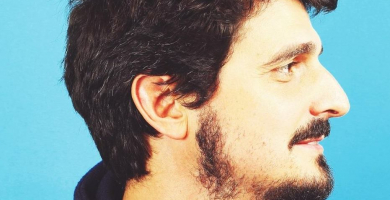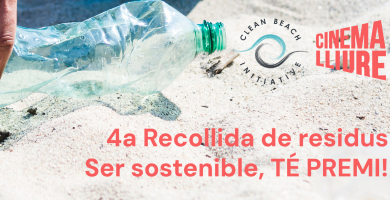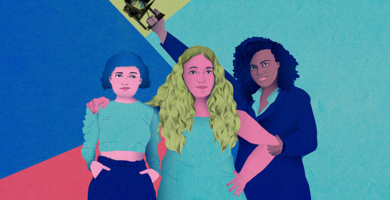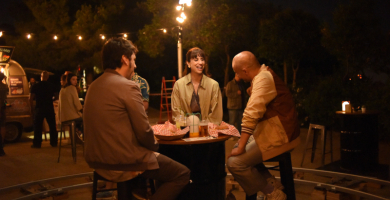
Andreu Meixide: “Social return is a concept that the public administration should ingrain on each euro that it grants to a project”.
We interview Andreu Meixide, member of the association Panorama180 and Co-Director of the BccN Barcelona Creative Commons Film Festival. We talk to him about this festival which has consolidated itself as a world benchmark space for Creative Commons film and audiovisual.

Your festival defends free films and culture. What is it and how is it different to other competitions?
It was established in 2010 in a context heavily influenced by the Sinde law, and the criminalization of downloading and everything that is digital. Those of us who are behind the festival come from different disciplines with a very important weight, whether professional or not professional, in audiovisual and film. At that time, we wanted to discover whether there were people in the audiovisual world who worked with tools which helped works to survive within the digital space. I say “helped” because we lived in an idea of 21st-century western society with very restrictive copyright protection laws. The physical world operated with access upon payment to a cinema and with expenses which, when the digital world arrived, have to be reconsidered. We had the sensation that not everyone in the sector was making the effort necessary to reconsider this with the speed required by the changes in society as regards the technological possibilities that we had in our hands. There were therefore dysfunctions which criminalized the individual who has technology at home which allows them to do things which are simply not good for others who have a business. We thought that this debate had to be accelerated.
Then, in our festival there has always been a political component. We hope that this continues to be the case and, when it is not there, we will stop doing it. Understanding politics as something daily and as a positioning of why we want to make films, how we want to do it and with whom. There is, however, also a component of vindication, of what is the meaning of the public money which goes to film or audiovisual. What education should society have to carry out about what it is for? It has many functions beyond the traditional function of leisure, although it is very good that this exists. There are, however, many people who, whether professionally or not professionally, use film and audiovisual for many other things. We hold our festival to host all these projects, the diversity of use and experience of film and audiovisual, because we did not find this in other festivals. In accordance with the umbrella which protects us, which is the social, solidarity-based and cooperative economy, we do not want our festival ever to lose the vision that people are at its heart. This means reflecting from the industrial, artistic and educational sphere, but always putting people first and not just money or the size of the audience, which sometimes seems to obsess our society.
Do you believe that the general public knows the advantages offered by the Creative Commons model and really sees it as an alternative to the established model?
In actual fact, we have never tried to advocate Creative Commons because in the end it is a tool. We started with it because it was the most standardized already legal alternative licence to copyright in Spain and many other countries. The idea of the name was to say: let’s reflect from the tools and possibilities and not from philosophy or the concept. Indeed, the world of free culture came a long time before the appearance of Creative Commons. We are promoting this debate from a pragmatic perspective, really talking about the possibilities that we have in the digital world and how this affects the non-digital sphere, in these two worlds which are maintaining a dialogue. Therefore, when there are people who criticize us because the tool does not work for everyone (we do not have any kind of link with the NGO Creative Commons), we answer that obviously everyone has to know the tools and decide whether or not they want to use them. Ten years ago was a time of great curiosity for them and how they could help you, not so much to move your work in the digital sphere, but rather to ask you how you want to do it and what freedoms you want to give it, what life you want it to have within the digital sphere. The tools helped us to do this, but 10 years later we have seen that a lot of education is still needed. Not everyone knows the possibilities and obviously not everyone wants to use them and it is completely legal. We do not want to force anyone or to talk about what is better or worse. We feel bad about the fact that there is no debate just because things are like they are. We have always fought against this. Things have been done in a certain way for a long time and each day we have to ask ourselves who stands to gain or lose and whether we have something to say. We are not obsessed about whether the tool in itself is more or less well-known, provided that there is an attitude. There are many people who participate in our festival who do not use Creative Commons, but they have an attitude of reconsidering, innovating, proposing, always with a certain ethical awareness of why you are doing things and how you are doing them.
Does the fact that you included the Workshop “Self-production and online distribution in the digital era” also form part of this education?
Yes, we always try to make it a rare festival with rarities, not because we want to be the outsiders or freaks but rather because, deliberately, we do not want to be a festival in which you go to a cinema to see a film and then leave. On the contrary, we believe that the beauty of films is that it is a collective experience. We therefore create a physical and not an online festival, which at the beginning we were told made more sense. We believe that this collective and shared experience is important and that what enriches a screening is everything which is not the screening, apart from the fact that this is good and people like it. We always hold colloquiums with someone from the team or the main characters, something that everyone does, but we try to go even further. And these workshop-type formats, experiential workshops or hybrids of different disciplines, closer to a live performance and acting than recorded or pre-recorded work, is what makes us alive and opens up the margins and horizons to make a festival closer to a festival of culture and not exclusively of films.
Do you believe that these hybrid formats attract the public more than a standard screening?
I do not know whether they attract more or less. Ten years ago we were more naive because we thought that the Internet would never have limits and now we have realized that this is not the case. There are always intermediaries, people who ask for their share in order to be able to manage the business. The Internet should be a free and neutral tool, but there are constant attempts to prevent this from being the case because of private interests. This learning can also be seen to a certain extent in our relations with the audience or the people who participate in the festival. A few years ago, we began to collaborate with the MACBA and the CCCB, facilities which are consolidated in the city, in order to be able to, as Pierre Bourdieu said, “classify” some films or simply be able to offer a high-quality big-screen projection of some works which did not reach the cinema circuit, not because they did not have the quality but because there is an overproduction infinitely higher than the capacity that the cinemas and distribution and screening circuits have. In principle, offering this opportunity was the festival’s leitmotiv. Years later, we realized, as did other festivals, that what people most like or what attracts them the most is this unique experience, not just that of a film that you can see in any cinema but rather you have the sensation that it is in a unique format, that it is happening on that day and little more. There is, however, also a very big saturation on a city and spectator scale. A great many activities are concentrated on the same weekends, like big music festivals, which generally empty out on those days because no one wants to compete for the public, press or visibility spaces. This greatly limits the calendars. Very similar proposals overlap. To give just one example, it breaks our heart that on the same days as our festival the Women’s Film Festival takes place, which is festival that we are madly in love with because we have very good relations with it or Fire! Our path goes more toward degrowth as a festival rather than growing, or seeking more interest in the screenings. That is to say, we try to take care of them and for them to have more quality, if necessary doing less things. Not growing, which is the natural trend of everyone. Because the festival always involves the personal experiences of those of us who make it and we are now experiencing it like that. I believe that we need a pause in order to be able to reflect on why there are so many things in the city and whether it makes sense that so many of us who are the same coincide at the same time.
This year you are devoting your programme to freedom of expression and you have formed a partnership with No Callaremos. Why this choice?
The festival is organized under the umbrella of free culture. Barcelona is one of the world’s cities which produce the most. There are more and more people considering how to distribute or show their film starting from when it is on line. We make a call four months earlier and we receive between 60 and 100 works from among which we choose. This year, as we are suffering from repression in many spheres, especially freedom of expression, we considered that we would put all our energy into providing a space for this, and we did so collaborating with the CCCB and No Callaremos in the framework of Orwell Day, screening a documentary on the subject of censorship in Spain, not now but historically. In the end, as a festival this is what moves us: putting debates on the table and trying to take them to another level. This year we have obtained a certain political impact in order to obtain certain commitments directly, sitting down artists in a situation of repression with politicians. If the festival can help this to happen, all the better. We are not moved by seeing a film and that’s it, but rather everything that is generated starting from this film. We therefore have many works from the world of activists, from people who make films with an attitude of influencing society.

You have also held the debate “Will shooting finish?, reconsidering audiovisual locally”. What problems do you think local productions face and how can they take advantage of tools such as Creative Commons?
The debate goes much further than Creative Commons. We wanted to sit people down who worked in Barcelona City Council from the municipal sphere with small, medium or medium-big producers and for there to be more points of knowledge about how you produce, what difficulties there are, what possibilities, what aid, what framework and what more could be done apart from what is already being done. We deliberately focused on the municipal sphere and not on the Generalitat or the Ministry, because there has always been an unwritten rule which says that the city council does not produce, that the Generalitat does. We still haven’t found the document or any written tablet of stone which says that this is the case. Especially, if we open the debate to what it means to produce and what it means to say film and audiovisual. If we stay with just one kind of industry production which has channels that we know, and which are insufficient, maybe that’s what it was like. But not if we open it up to other fields, such as education, social mediation, teaching, where there is also film and audiovisual. It is not just the industry production which is film and audiovisual, just as it is not just cinemas which show films. We have to enter the 21st century and make the debate more complex. The municipal sphere plays a very important role, beyond what it does now. As a festival, we have always wanted to be a bridge over two waters, seeking a transfer between the world of the established industry and the world of those who do not recognize themselves in it or fit in, and we sincerely believe that this is the great majority of people who experience and devote themselves to audiovisual and film or at least who use these tools. All this comes from a reflection that we began two years ago on what social return means in film and how we can measure it. This is a concept that the public administration should ingrain on each euro that it grants to a project. We reflect on what the social return of these projects is. We are not talking about a pink unicorn, but rather about a concept that we should be able to parameterize and measure. At present, this is not being done or everything which should be being done is not being done.
What was the result of the debate?
We approached the debate from the importance of doing it in the medium term and in a constructive manner about how to be able to create new scenarios of public money – private money collaboration or of whatever other type in order to produce more, better and more broadly. But we stayed with what is urgent, the present. The most direct demand, which is necessary and which has to be done, is to make what is already being done profitable. Film and audiovisual, especially when looked at from the viewpoint of public support, has to take itself much more seriously, which means its social return and social responsibility. I always talk about the two sides of the coin, one the public money which can go to a film, but the other has to be the return that it must have for society. We have to enter the 21st century, to go beyond audiences and numbers, the subjects of the film, justifying them as return. How can it be that there are works which, although they are made with the most strictly commercial logic, with public support, then don’t enter the educational circuits or cannot enter non-profit uses or reuse but rather they exclusively prejudice the commercial circuit for which they were designed? This should not still be happening.
For us, audiovisual and film can have this cross-cutting nature. We must see far beyond the artistic discipline. We gain access to a large part of knowledge as society through audiovisual. It forms part of our daily life. We cannot see the point of putting films in a box as cinema and everything from the social media or audiovisual in another box. In the end, there is an audiovisual culture that we have to be able to reinforce much more through education and schools. We must be able to do this in our daily activity and have sovereignty over what kind of audiovisual culture we want. Audiovisual is one of the essential tools that we have, like talking or listening. Nowadays, we should consider it almost as a sense of the body. And this power, which must be cross-cutting and join the different parts, often gives the sensation that it is not of interest to some sectors, precisely those which already have a way of operating. It is blocked because it can rebalance important weights, reassign roles, and many people are not interested in this, I imagine, because they could lose this share of power. But, in the end, who has to decide what audiovisual is for? Just one or two producers? A politician? Who do we want to make decisions? And more so, if we look at it from the viewpoint of the public administration, because private money is private and has its own criteria, whether you agree with it or not, but public money belongs to everyone and this reflection should therefore be public and collective. At present, I would like to be shown which private industry maintains itself without any public support. Maybe they don’t receive money directly, but there are other types of support beyond subsidies. We need to open this debate, which does not exist. It is essential.
Do you think that there are interesting educational projects in the city related to audiovisual?
Of course. In the city, in other places and countries, and there should be many more. Experiences like Cinema on Course, for example. All the work carried out by audiovisual education organizations is unquestionable. The same Drac Màgic which organizes the Women’s Film Festival, Bao A Qu, Teleduca, the Quepo foundation, Càmeras i acció and many more. This is consistent with the concept of “skiing off-piste”. For many years, we were told that you ski in a certain way and on slopes which are in a certain form. But the drama is that the great majority of people who want to work with audiovisual and film need to ski off-piste, maybe they didn’t want to, but they do it. Because what they want is to ski and to fly down the mountain. Not everyone fits on the slope. It is designed to be skied on by those who could make film and audiovisual before. And, moreover, it is designed with certain rules and now people want to ski in many other ways for other reasons. Some people for recreation, others want to arrive earlier... It is a simple metaphor, but it shows that if we lose sight of the fact that there is more off-piste than on-piste, we will be having an incomplete debate. We are leaving the 21st century outside. All these people are producers, associations, organizations or foundations which have audiovisual at their heart. We refuse to think that it cannot be considered as film or audiovisual, and we cannot consider it directly with a more traditional producer.
After this edition, what challenges do you have for the following one?
First, to celebrate our 10th anniversary. Then we will consider whether or not there is continuity. We would very much like it to be an edition which is meaningful and real. Obviously, we will have to have a minimum of retrospective, not so much to celebrate what has been achieved but, on the contrary, to socialize and share the knowledge acquired. To show where the expectations of those happy 2000s are now, and to highlight the things that we didn’t even imagine would happen, and which have indeed happened. With a certain, maybe not concern, but a will to place degrowth on the table or the conscious and ethical approach at least on a city scale, whether it is required and necessary for all of us to continue on this increasingly big path. At least that’s not how we feel it. If festivals don’t become human, we have no reason to exist; if we are not like people and the context that they experience, we become a market mechanism and we’re not interested in that. We wanted to be able to help give the off-piste visibility, the people who do not feel represented or have no place in this market, but who have the need and desire to continue working. We wanted to be this space, acting as a bridge.
We therefore have to raise the debate with everyone; otherwise, we are being unfair with the diversity that I believe exists in society and in particular in film and audiovisual. I believe that it should at least be denounced that there are people who are making film and audiovisual, although it does not last 90 minutes, although it does not have an introduction, climax and denouement and it is not designed to be seen on the big screen but rather on a mobile, and that they are not incorporated into the debate or, even worse, that there is a sensation that there are people who do not want to embrace this real diversity out of protectionism for a certain circuit. It is irresponsible that we are not capable of conveying that the debate must be much broader, must embrace many more agents and be more real; we deserve this as a society.









